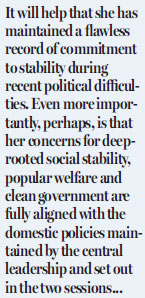Carrie Lam can earn trust of all sections of HK society
Updated: 2017-03-28 06:56
By Tim Collard(HK Edition)
|
|||||||
Tim Collard argues that HK's CE is one of the world's most demanding leadership positions - and in these trying times a steady hand at the helm is essential
So, the race went to the favorite after all. The announcement that Carrie Lam Cheng Yuet-ngor has won a clear majority in the Election Committee and will take office on July 1 as the Hong Kong Special Administrative Region's next Chief Executive did not come as a surprise. But then the electors were making the point that, in more ways than one, this is not a time for surprises.
Konrad Adenauer, the first chancellor of the Federal Republic of Germany - who had the job of rebuilding the country from its devastated post-war state - fought and won election after election on the slogan "No Experiments!" His meaning, of course, was that the tricky and difficult work of building up a new political and economic entity required a long-term plan to be conceived and carried out without disruptions, distractions and ill-thought-out jumps from side to side. The systems and cultures are different, but it is clear that what the central government and the Hong Kong electors want from Lam is the same as what the Germans wanted from Adenauer.

Lam has a background with which ordinary Hong Kong people can easily identify. She did not grow up rich or privileged; her success was built on an excellent education and hard work. After an impressive civil-service career, bringing her to the leadership of Hong Kong's Economic and Trade Office in London and role as permanent secretary for home affairs, all well before the age of 50; she was offered a place in then-chief executive Donald Tsang Yam-kuen's governing team and went on to the job of chief secretary, and thereby No 2, in Chief Executive Leung Chun-ying's new administration in 2012.
This career path suggests solid competence rather than any tendency toward spectacular new departures. Hong Kong has established a stable economic base which has so far protected it against sudden lurches and crises, and this will require a safe pair of hands to negotiate whatever rocky terrain may lie ahead; as for the territory's political development, the past few years have provided the territory with a number of serious challenges which have remained unsolved, which emphasize still more the need for a safe pair of hands and a calm temperament. Lam's record of solid achievement, the perception that she is not a politician given to panic and over-reaction and thus easily deflected from her course, and the impression she gives of being able to handle the vital working relationship with the central authorities in Beijing, all have been reasons for her decisive majority on the Election Committee.
The Hong Kong Chief Executive is one of the world's most challenging leadership roles. The "One Country, Two Systems" principle, which has created a constitutional system unique in the world, means the CE has to enjoy the trust of the central government in Beijing and simultaneously that of the people she is governing; this trust has to be continuously renewed.
As chief secretary, Lam concentrated largely on the less spectacular aspects of government. Realizing that the turbulent political events of Leung's administration had rendered further speculation into future political changes inappropriate for the time being, she became the administration's flag-bearer for social and welfare issues which remain a persistent challenge to Hong Kong's policymakers, and which are more vital to the welfare of the territory than the political superstructure. Her background will have fitted her especially well for this role; both her origins among the ordinary working people of Hong Kong and her lifetime commitment to Catholic Christianity, which all over the world lays emphasis on social stability, moral uprightness and care of the less fortunate, have undoubtedly contributed to her qualifications for leadership based on the promotion of stability built on deep social and moral foundations. For these reasons she will also be keen to preserve Hong Kong's splendid reputation for clean government.
Clearly the most significant aspect of Lam's tenure will be her management of Hong Kong's founding principles, as set out in the Basic Law and the "One Country, Two Systems" policy, and her capacity to cooperate with the central government. It will help that she has maintained a flawless record of commitment to stability during recent political difficulties. Even more importantly, perhaps, is that her concerns for deep-rooted social stability, popular welfare and clean government are fully aligned with the domestic policies maintained by the central leadership and set out in the two sessions held in Beijing earlier this month.
Hong Kong is a lively, open and complex society and administering it can never be an entirely smooth ride: But, if one faces a bumpy ride, it is best to be safely strapped in from the start. Lam starts from a secure position, with a solid personal background and strong institutional support; it is now up to her to maintain the trust and appreciation of all sections of Hong Kong society. I would not expect any experiments, or any surprises.
The author is a sinologist and former British diplomat in Beijing for nine years. He now works as a freelance commentator and writer.
(HK Edition 03/28/2017 page8)